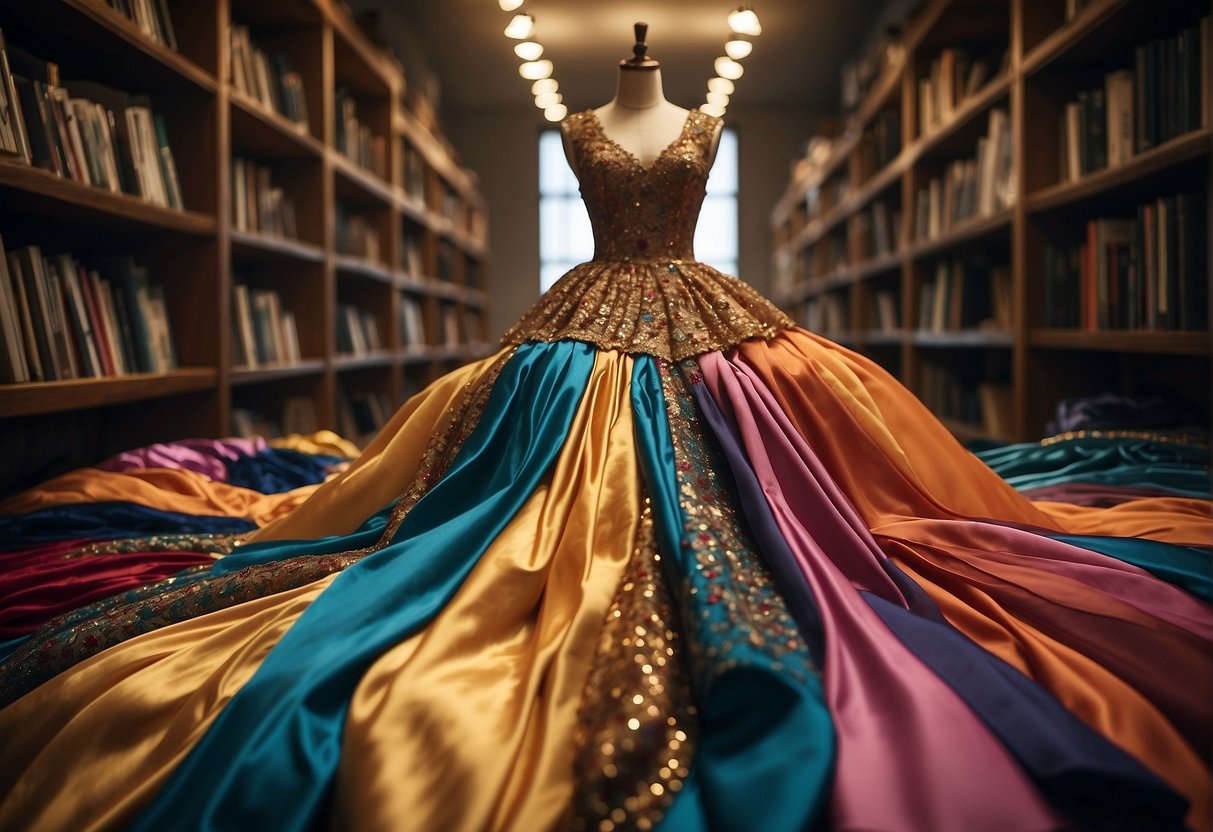Teenagers often go through phases of self-discovery and self-expression as they navigate the complexities of growing up. For some teenage boys, this may involve expressing themselves by wearing dresses or other traditionally feminine clothing. While this may be a new and unexpected experience for parents, it is important to understand that gender expression is a normal and healthy part of human diversity.
Parents may be concerned that their teenage son wearing dresses is a sign of gender dysphoria or that it may lead to bullying or social isolation. However, studies have shown that children who express themselves in non-traditional gender roles do not have a higher incidence of mental health issues or social problems. In fact, parental support and acceptance of their child’s gender expression can lead to increased self-esteem and confidence.
Key Takeaways:
- Gender expression is a normal and healthy part of human diversity.
- Parental support and acceptance of their child’s gender expression can lead to increased self-esteem and confidence.
- Children who express themselves in non-traditional gender roles do not have a higher incidence of mental health issues or social problems.
Understanding Gender Expression
Defining Gender Identity and Expression
Gender identity refers to a person’s internal sense of their gender, which may or may not align with the sex they were assigned at birth. Gender expression, on the other hand, refers to the way people present their gender to others through their appearance, behavior, and other forms of self-expression.
It is important to note that gender identity and expression are not necessarily linked. For example, a person who identifies as male may choose to express their gender in a variety of ways, including wearing dresses or makeup. Similarly, a person who identifies as female may choose to present themselves in more traditionally masculine ways.
The Spectrum of Gender Identities
Gender identity exists on a spectrum, with many people identifying as somewhere between male and female, or as neither. This is known as being non-binary or gender non-conforming. It is important to respect and support people’s gender identities, regardless of where they fall on the spectrum.
Gender Stereotypes and Their Impact
Gender stereotypes are cultural beliefs about what it means to be male or female. These stereotypes can be harmful, as they often reinforce rigid gender roles and expectations. For example, the idea that boys should not wear dresses or play with dolls can be damaging to children who do not conform to these expectations.
Parents and caregivers can help combat gender stereotypes by encouraging children to express themselves in ways that feel authentic to them, regardless of their gender. This can help promote a more inclusive and accepting society, where people are free to express themselves in whatever way feels right to them.
Parental Support and Acceptance
When a teenage son expresses interest in wearing dresses, it is important for parents to provide a supportive and accepting environment. This can be a challenging time for both the teenager and their family members, but with the right approach, it can also be an opportunity for growth and understanding.
Fostering a Supportive Home Environment
One of the most important things parents can do is to create a supportive home environment where their son can feel comfortable expressing themselves. This can involve a range of things, from providing clothing options that align with their son’s preferences, to creating a safe space where he can talk about his feelings and concerns.
Communicating with Your Son
Effective communication is key to building a strong relationship with a teenage son who likes to wear dresses. Parents should take the time to listen to their son’s concerns and feelings, and provide reassurance and support where needed. This can help build trust and confidence, and make it easier for the teenager to express themselves openly and honestly.
Dealing with Concerns and Emotions
It is natural for parents to have concerns and emotions when their son expresses interest in wearing dresses. However, it is important to approach these feelings in a constructive way, rather than reacting with anger or disapproval. Parents can work through their concerns by talking to other parents who have been through similar experiences, or seeking support from a therapist or counselor.
Ultimately, the most important thing parents can do is to support their son’s expression of gender identity and provide a safe and accepting environment for them to grow and thrive. With the right approach, parents can help their son build confidence and self-esteem, and develop a positive sense of self as they navigate the challenges of adolescence.
Navigating Social Challenges
Parents of teenage boys who wear dresses may face a variety of social challenges. These challenges may arise from school dynamics, peer pressure, interacting with siblings and relatives, and public perception and responses.
School Dynamics and Peer Pressure
School can be a challenging environment for gender non-conforming students. Teenagers are often influenced by their peers, and those who do not conform to traditional gender norms may face bullying and harassment. Parents can help their sons navigate these challenges by communicating with school administrators and teachers. They can also encourage their sons to join clubs or groups that support diversity and inclusion.
Interacting with Siblings and Relatives
Parents may also face challenges when their teenage son wears dresses around siblings and relatives. Siblings may feel confused or uncomfortable with their brother’s clothing choices, and relatives may not understand or accept them. Parents can help their children navigate these challenges by having open and honest conversations about gender identity and expression. They can also encourage their children to express themselves in ways that feel authentic to them.
Public Perception and Responses
Parents of gender non-conforming children may also face challenges from the public. They may receive negative comments or stares when their son wears dresses in public, and they may feel pressure to conform to traditional gender norms. Parents can help their children navigate these challenges by modeling acceptance and understanding. They can also seek out resources and support from organizations that promote diversity and inclusion.
Overall, navigating social challenges when a teenage son wears dresses can be difficult, but it is important for parents to support their children’s gender identity and expression. By communicating openly and honestly with their children, seeking out resources and support, and modeling acceptance and understanding, parents can help their children thrive in a world that may not always be accepting of their choices.
Promoting Self-Expression and Confidence
Teenagers are known for their rebellious streaks and desire to express themselves in unique ways. It is important for parents to support their children’s self-expression and promote confidence in their choices. Here are some ways parents can encourage their teenage sons to express themselves and build confidence.
Encouraging Diverse Interests
Parents can encourage their teenage sons to explore diverse interests and hobbies. This can help them discover new passions and talents, and feel more confident in their abilities. Encouraging them to participate in activities that are outside their comfort zone can also help them build resilience and self-assurance.
Clothing Choices and Personal Style
Parents should respect their teenage sons’ clothing choices and personal style. If their son likes to wear dresses, parents should be supportive and not impose gender stereotypes. They can help their son find clothes that fit well and make them feel comfortable and confident.
The Role of Toys and Media in Expression
Toys and media can also play a role in teenage boys’ self-expression. Parents should encourage their sons to play with a variety of toys, including dolls and action figures, to help them explore different interests and express themselves creatively. They should also be mindful of the media their sons consume, and encourage them to watch shows and movies that promote diverse gender roles and positive body image.
Overall, promoting self-expression and confidence in teenage boys is important for their emotional well-being and personal growth. Parents should be supportive and open-minded, and encourage their sons to explore their interests and express themselves in their own unique way.
Resources and Further Reading
Educational Materials and Research
Parents of teenagers who are exploring their gender identity and expression may benefit from educational materials and research on the subject. The American Academy of Pediatrics has published a policy statement on “Ensuring Comprehensive Care and Support for Transgender and Gender-Diverse Children and Adolescents” which provides guidance for healthcare providers, educators, and parents. The Human Rights Campaign Foundation has also published a resource guide for parents of transgender children which includes information on gender identity development, transitioning, and legal rights.
Support Groups and Communities
Support groups and communities can provide valuable resources and a sense of community for parents of teenagers who are exploring their gender identity and expression. PFLAG (Parents, Families and Friends of Lesbians and Gays) is a national organization with local chapters that provides support, education, and advocacy for LGBTQ+ individuals and their families. The Transgender Resource Center of New Mexico is a nonprofit organization that provides education, support, and advocacy for transgender and gender non-conforming individuals and their families.
Professional Guidance and Counseling
Professional guidance and counseling can be helpful for parents of teenagers who are exploring their gender identity and expression. Gender therapists and counselors can provide guidance and support for both the teenager and their family. The World Professional Association for Transgender Health (WPATH) provides guidelines for the care of transgender and gender non-conforming individuals, including guidelines for mental health professionals.
It is important to note that each teenager’s experience with gender identity and expression is unique, and there is no one “right” way to support them. Parents should prioritize their teenager’s health and well-being, and seek out resources and support as needed.
Frequently Asked Questions
How should parents respond if their son expresses a desire to wear dresses?
If your son expresses a desire to wear dresses, it’s important to respond with love, support, and understanding. Parents should avoid shaming or discouraging their son from expressing themselves in a way that feels authentic to them.
What does it mean when a boy shows an interest in wearing dresses?
A boy showing an interest in wearing dresses does not necessarily mean that he is gay or transgender. It simply means that he is exploring his gender identity and expression, which is a normal part of development. Parents should encourage their son to express himself in a way that feels true to him without making assumptions about his sexual orientation or gender identity.
Are there any psychological implications for a boy who wants to wear dresses?
There are no psychological implications for a boy who wants to wear dresses. However, there may be negative consequences if the child is shamed or rejected by their peers or family members. Parents should support their son’s choices and ensure that he feels safe and accepted.
How can parents support their son who chooses to wear dresses to school?
Parents can support their son who chooses to wear dresses to school by speaking with school administrators and teachers to ensure that their son is protected from bullying and harassment. They can also work with their son to develop coping strategies for dealing with negative comments or reactions from other students.
What are some ways to discuss gender expression with a child interested in wearing dresses?
Parents can discuss gender expression with their child by explaining that everyone has the right to express themselves in a way that feels true to them, regardless of their gender. They can also provide their child with age-appropriate resources and books that explore gender identity and expression.
How can parents ensure their son feels safe and accepted when he wears dresses?
Parents can ensure that their son feels safe and accepted when he wears dresses by creating a supportive and accepting environment at home. They can also work with their son to develop strategies for dealing with negative reactions from others and provide him with resources and support outside of the home.

My name is Laura, and as a mother of two, I understand firsthand the joys and challenges of raising a child. That’s why I created this website, to provide a comprehensive and trustworthy source of information and support for new and expectant parents.



